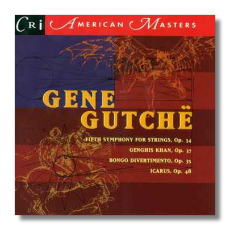
The Internet's Premier Classical Music Source
Related Links
- Latest Reviews
- More Reviews
-
By Composer
-
Collections
DVD & Blu-ray
Books
Concert Reviews
Articles/Interviews
Software
Audio
Search Amazon
Recommended Links
Site News
 CD Review
CD Review
Gene Gutchë

Orchestral Music
- Symphony for Strings #5, Op. 34
- Genghis Khan, Op. 37
- Bongo Divertimento, Op. 35
- Icarus, Op. 48
Cincinnati Symphony Orchestra/Max Rudolf
Louisville Orchestra/Jorge Mester
Marvin Dalhgren, percussion/St. Paul Chamber Orchestra/Leopold Sipe
Rochester Philharmonic Orchestra/David Zinman
CRI CD825 ADD 64:56
This is another CD in CRI's "American Masters" series. As with other discs in this series, it combines material recorded over a period of several years (and here, even for different record labels) to create a balanced and varied portrait of the composer.
"Gene" Gutchë was born in Berlin in 1907. Despite encouragement from Ferruccio Busoni, his father didn't support a career in music, and Gutchë came to the United States when he was still a teenager in search of both his uncle and self-determination. Eventually, he arrived in Minnesota, only to find that his uncle had moved to Canada. Nevertheless, Gutchë stayed in the Twin Cities, got a job, and took a wife. He enrolled in a graduate program in composition at the University of Minnesota, and finally completed it in the 1950s, when he was well into his forties. (Eight years of living and working in New York City slowed him down some.) He has lived in White Bear Lake, Minnesota for more than four decades. At the age of 92, he, with his wife Marion, still lives there.
Gutchë's music doesn't throw itself at the listener in a desperate plea to be loved, but it is easy to listen to. It is modern, but not party to any of the trendy "isms." The works on this disc, written between 1962 and 1975, reveal that Gutchë is a humanist who enjoys dramatic writing agreeably tempered by a degree of coolness.
Icarus, the most recent work here, is in four sections. Each relates to a different aspect of Columbus's explorations. While not precisely programmatic, Gutchë's writing is pictorial. For example, the slow second movement conveys a feeling of awe, even fear, in the face of the ocean's impersonal limitlessness.
Genghis Khan is 9-minute work, written in 1963. By omitting all strings save the double basses from the orchestra, Gutchë hardens this sound-portrait of the brutal Mongol conqueror. He also is successful at suggesting both time and place without falling back on tired musical stereotypes.
The Bongo Divertimento (1962) is just that. Gutchë frees the little drums of their expected Latin associations to create what might be the only showpiece written for bongo and orchestra. The divertimento is in five short movements, and humor, not abundant elsewhere on this disc, is in the forefront.
The Fifth Symphony for Strings (also from 1962) is the strongest work here. Gutchë joins composers as diverse as Bartók and Ginastera in rising to the challenge of writing interesting music for an orchestra lacking woodwinds, brass, and percussion. The symphony is purposeful, serious, and full of structural and emotional integrity.
The original recordings date from between 1964 and 1978. The performances range from good to excellent, as does the engineering. Max Rudolf's recording of the Fifth Symphony for Strings stands out as the best of the four recordings. The generous booklet notes are by Michael Barone, and they include annotations from the original LP releases.
Copyright © 2000, Raymond Tuttle


















